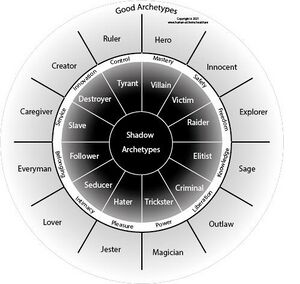Shadow Self
Jung's view of the shadow self explores our repressed or hidden motives and desires. He believes that too much focus on the persona - the public face we show to the world - leads to disconnection from our true selves and to lack of authenticity.
The desires of the shadow self contain negative impulses that should not be acted upon, but may also include overly stigmatized emotions and drives that can be expressed in healthy ways.
Consider a negative emotion like rage and how it can drive us in athletics, or how lust can fuel the creation of art.
One must find a balancing point between being who society wants us to be - which can be useful for group activities and social cohesion - and acting on our internal drives which make us unique individuals with diverse perspectives and vibrant inner realities.
It is also important to focus on healthy expression, as some of the things we repress - like tribalistic violence - can easily turn to tragic ends.
Discovering ones inner motivations can be done through meditation, mindfulness, dream analysis, and other techniques for exploring the subconscious and unconscious self.
Finding one's people: improves opportunity for authenticity.
HeatSync Labs story, BSBC story, Amazon story.
The Vase: Self-expression versus contemporary common crafts, repression.
Script
Premise
The Shadow Self is comprised of our repressed or hidden motives and desires. This is in contrast to The Persona, which is the public expression of our selves that we show the world. Too much focus on The Persona - our public face - leads to disconnection from our true selves and to lack of authenticity.
Examples of key archetypes and their shadow counterparts are listed after this section.
Counterpoint
The desires of the shadow self include negative impulses that should not be acted upon. Cultural repression of these dark desires, however, may be excessive; limiting the healthy expressions of these motives and inhibiting authenticity.
Handle Counterpoint
While uncontrolled expression of one's shadow self can be destructive, consider how The Bully or The Tyrant can be channeled into athletic performance. Emotions available to The Perfectionist and The Addict can be leveraged by artists to create their greatest works.
Integrate Main and Counter
One must find a balancing point between being who society wants us to be - which can be useful for group activities and social cohesion - and acting on our internal drives which make us unique individuals with diverse perspectives and vibrant inner realities.
Take Care, However
It is also important to focus on healthy expression, as some of the things we repress - like tribalistic violence - can easily turn to tragic ends.
How To
Discovering ones inner motivations can be done through meditation, mindfulness, dream analysis, and other techniques for exploring the subconscious and unconscious self.
Benefits
Finding one's people: improves opportunity for authenticity.
Stories
HeatSync Labs story, BSBC story, Amazon story.
The Vase: Self-expression versus contemporary common crafts, repression.
Unrelated?: How dare you not see yourself as good!
Archetypes
- The Hero / The Bully (strength)
- Good: The Hero is courageous, strong, and self-sacrificing. They strive to overcome obstacles and protect others.
- Shadow: The Bully uses their strength to dominate and intimidate others, acting out of arrogance or a need to prove themselves.
- The Caregiver / The Martyr (service)
- Good: The Caregiver is compassionate, nurturing, and selfless, providing support and care for others.
- Shadow: The Martyr sacrifices themselves unnecessarily, often to the detriment of their own well-being and sometimes with a sense of victimhood or resentment.
- The Sage / The Know-It-All (knowledge)
- Good: The Sage is wise, knowledgeable, and seeks truth. They offer guidance and insight.
- Shadow: The Know-It-All is arrogant, dismissive of others' opinions, and may use their knowledge to belittle or manipulate.
- The Explorer / The Wanderer (curiosity)
- Good: The Explorer is adventurous, curious, and seeks new experiences and knowledge.
- Shadow: The Wanderer is aimless, restless, and avoids commitment or responsibility, often feeling lost or unfulfilled.
- The Lover / The Addict (passion)
- Good: The Lover is passionate, empathetic, and values relationships and connection.
- Shadow: The Addict seeks pleasure or emotional highs at the expense of stability and self-control, often leading to destructive behavior.
- The Creator / The Perfectionist (innovation)
- Good: The Creator is imaginative, innovative, and seeks to bring new ideas and expressions into the world.
- Shadow: The Perfectionist is overly critical, never satisfied with their work, and may become paralyzed by the fear of imperfection.
- The Ruler / The Tyrant (leadership)
- Good: The Ruler is responsible, organized, and strives to create order and stability.
- Shadow: The Tyrant is controlling, oppressive, and abuses power to dominate others.
- The Magician / The Manipulator (influence)
- Good: The Magician is transformative, visionary, and seeks to create change and growth.
- Shadow: The Manipulator uses their insight and influence for selfish or deceptive purposes, often exploiting others.
- The Innocent / The Naïve (optimism)
- Good: The Innocent is optimistic, pure-hearted, and seeks happiness and simplicity.
- Shadow: The Naïve is overly trusting, gullible, and may avoid reality or deny unpleasant truths.
- The Rebel / The Outlaw (independence)
- Good: The Rebel is courageous, challenges the status quo, and seeks to bring about change and innovation.
- Shadow: The Outlaw is destructive, irresponsible, and may reject authority or norms in a way that harms themselves or others.
- The Everyman / The Conformist (community)
- Good: The Everyman is relatable, grounded, and seeks to belong and connect with others.
- Shadow: The Conformist sacrifices individuality to fit in, often losing their sense of self and becoming passive or complacent.
- The Jester / The Fool (irreverence)
- Good: The Jester is playful, humorous, and brings joy and perspective through levity.
- Shadow: The Fool is irresponsible, frivolous, and uses humor to deflect from serious issues or avoid accountability.
